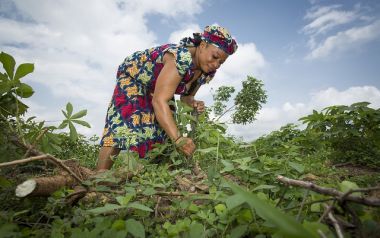23 October 2017. Women play an important role in food production and provision in Africa South of the Sahara (SSA), yet are underrepresented in the agricultural research community in many countries. Fewer women than men are trained, recruited, and employed in the agricultural sciences. Where they are employed, female researchers are often young and less qualified than their male colleagues.
The good news is that, according to a recent paper in the Journal of Gender, Agriculture and Food Security by Nienke Beintema, head of the Agricultural Science and Technology Indicators (ASTI) initiative, many African countries have begun making progress towards a gender balance in their agricultural research systems. The data can be accessed via ASTI's new Women in African Agricultural Research Data Portal, created in partnership with African Women for Agricultural Research and Development (AWARD).
The number of women researchers in Africa South of the Sahara rose in both absolute and relative terms between 2008 and 2014—possibly due to increased access to education for girls, which has resulted in more women enrolled in agricultural sciences, and sciences overall.
Beyond the goal of basic equity, there are many arguments for including more women in agricultural research. As the InterAcademy Council observed, (Inventing a better future, 2004, 160 pages) more than half of most countries’ populations—their women—have traditionally been overlooked for important jobs or were deprived of the education needed to make them contenders, robbing countries of enormous reservoirs of talent in science and technology. Higher rates of female participation in science and technology have been shown to improve the quality and competitiveness of research and innovation.
The good news is that, according to a recent paper in the Journal of Gender, Agriculture and Food Security by Nienke Beintema, head of the Agricultural Science and Technology Indicators (ASTI) initiative, many African countries have begun making progress towards a gender balance in their agricultural research systems. The data can be accessed via ASTI's new Women in African Agricultural Research Data Portal, created in partnership with African Women for Agricultural Research and Development (AWARD).
The number of women researchers in Africa South of the Sahara rose in both absolute and relative terms between 2008 and 2014—possibly due to increased access to education for girls, which has resulted in more women enrolled in agricultural sciences, and sciences overall.


No comments:
Post a Comment